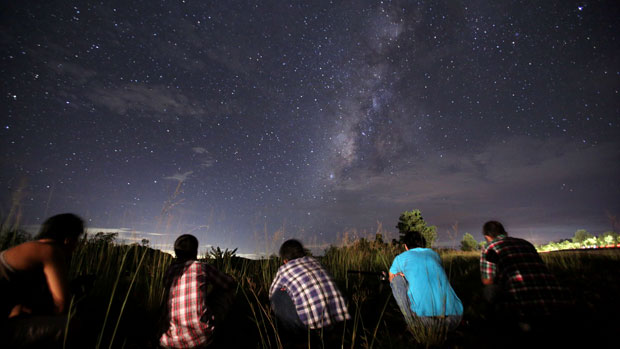Perseid meteor shower: how to see the shooting stars tonight
The spectacular celestial light of the Perseids will be visible again tonight - if the weather is fine

A free daily email with the biggest news stories of the day – and the best features from TheWeek.com
You are now subscribed
Your newsletter sign-up was successful
The Perseid meteor shower is set to reach its climax tonight, lighting up the night sky with shooting stars.
Caused by debris left behind by the Swift-Tuttle comet, which has been dubbed the "fireball champion", the Perseid meteor shower is the most spectacular of the year in the northern hemisphere.
"The peak dates to see the Perseid meteor shower are between the 12-13 August, when up to 100 meteors an hour can be seen," says the Met Office. And unlike last year, when a supermoon brightened the night sky and obscured the show, this year's appearance of the annual phenomenon coincides with a new moon.
The Week
Escape your echo chamber. Get the facts behind the news, plus analysis from multiple perspectives.

Sign up for The Week's Free Newsletters
From our morning news briefing to a weekly Good News Newsletter, get the best of The Week delivered directly to your inbox.
From our morning news briefing to a weekly Good News Newsletter, get the best of The Week delivered directly to your inbox.
However, the weather may intervene to prevent productive stargazing. Cloud is expected to settle over southern, central and eastern England, central Wales and northern Scotland for much of the night. At peak viewing time, in the early hours of Thursday morning, the clearest spots are likely to be England north of Manchester, lowland Scotland and the north and western fringes of Wales.
What is a Perseid shower?
The Perseid is the brightest and most consistent meteor shower. It often produces 50 to 100 meteors per hour at its peak. It takes place every August, and is caused when small specks of debris left behind by comet Swift-Tuttle's voyage through the solar system. When the Earth passes through this cloud of dust the particles disintegrate into flashes of light. Sometimes, a Perseid fireball will blaze across the sky, producing a particularly spectacular effect.
Where and when can I see them?
A free daily email with the biggest news stories of the day – and the best features from TheWeek.com
The pre-dawn hours are the best time to view Perseid showers. The further from a city and its plentiful urban lights you can get the better. Having found your spot, search for the darkest patch of sky you can find, make yourself comfortable and wait for the celestial show to begin.
Any other tips?
Do not be tempted to use a telescope or binoculars, as either instrument will simply reduce the amount of sky you can view, thus diminishing your chance of seeing the meteors. Planning to Instagram what you see? Resist the temptation to glance at your smartphone while you wait, as the glare from its screen will harm your night vision.
-
 The environmental cost of GLP-1s
The environmental cost of GLP-1sThe explainer Producing the drugs is a dirty process
-
 Greenland’s capital becomes ground zero for the country’s diplomatic straits
Greenland’s capital becomes ground zero for the country’s diplomatic straitsIN THE SPOTLIGHT A flurry of new consular activity in Nuuk shows how important Greenland has become to Europeans’ anxiety about American imperialism
-
 ‘This is something that happens all too often’
‘This is something that happens all too often’Instant Opinion Opinion, comment and editorials of the day
-
 Nasa’s new dark matter map
Nasa’s new dark matter mapUnder the Radar High-resolution images may help scientists understand the ‘gravitational scaffolding into which everything else falls and is built into galaxies’
-
 Moon dust has earthly elements thanks to a magnetic bridge
Moon dust has earthly elements thanks to a magnetic bridgeUnder the radar The substances could help supply a lunar base
-
 How Mars influences Earth’s climate
How Mars influences Earth’s climateThe explainer A pull in the right direction
-
 The ‘eclipse of the century’ is coming in 2027
The ‘eclipse of the century’ is coming in 2027Under the radar It will last for over 6 minutes
-
 NASA discovered ‘resilient’ microbes in its cleanrooms
NASA discovered ‘resilient’ microbes in its cleanroomsUnder the radar The bacteria could contaminate space
-
 Artemis II: back to the Moon
Artemis II: back to the MoonThe Explainer Four astronauts will soon be blasting off into deep space – the first to do so in half a century
-
 The mysterious origin of a lemon-shaped exoplanet
The mysterious origin of a lemon-shaped exoplanetUnder the radar It may be made from a former star
-
 The 5 biggest astronomy stories of 2025
The 5 biggest astronomy stories of 2025In the spotlight From moons, to comets, to pop stars in orbit